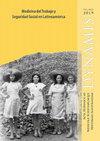La asistencia médica a los refugiados en Francia durante la Segunda Guerra Mundial: la Clínica de Marsella (1941-1945)
IF 0.1
4区 哲学
Q3 HISTORY & PHILOSOPHY OF SCIENCE
引用次数: 0
Abstract
espanolLa poblacion refugiada, tanto los exilados republicanos espanoles como los fugitivos del nazismo de toda Europa, concentrada en el sur de Francia a partir sobre todo de 1939, planteo una crisis humanitaria con ingentes demandas medico-sociales. A partir de junio de 1940, Marsella y sus alrededores se convirtieron en la ultima esperanza para decenas de miles de ellos, la mayoria sumidos en una situacion de extrema necesidad, asi como para los franceses desplazados de Alsacia, Lorena y las zonas de guerra a resultas de la invasion alemana. A mediados de marzo de 1941, el Unitarian Service Committee (USC) —agencia humanitariacreada en 1940 por la iglesia unitaria norteamericana con el fin de ayudar a las personas perseguidas en Europa por motivos de raza, religion o ideologia— promovio, junto a la Oeuvre de Secours aux Enfants (OSE) —organizacion judia de ayuda a la infancia—, el establecimiento en Marsella de un dispensario medico-social que, de una u otra forma, logro mantenerse operativo desde julio de 1941 hasta el final de la Segunda Guerra Mundial. Su mision era atender a miles de refugiados sin recursos, incluidos los republicanos espanoles, que intentaban huir de Francia a traves de su puerto. Esa primera experiencia humanitaria del USC en el campo dela medicina priorizo las acciones de asistencia y prevencion sanitaria a las personas recluidas en los campos de internamiento. Su popularidad hizo que en Francia pronto se identificara al USC con la ayuda sanitaria a los refugiados y obtuviera el reconocimiento de las demas organizaciones de socorro, incluida la Cruz Roja Internacional. En este articulo se analiza, a partir sobre todo de la documentacion del USC preservada en la Andover-Harvard Theological Library (Cambridge, MA), el modelo organizativo y la labor asistencial, muy exigente para los escasos recursos disponibles, que caracterizo a la popularmente conocida como «Clinica de Marsella» del USC durante la Segunda Guerra Mundial. EnglishSpanish Republican refugees and fugitives from Nazism throughout Europe gathered in southern France from 1939 onwards, posing a humanitarian crisis that made huge social and health demands. From June 1940 onwards, Marseille and its surroundings became the last hope for tens of thousands of these exiles and for French people displaced by the German invasion from AlsaceLorraine and war zones. In mid-March 1941, a socio-medical dispensary was established in Marseille by the Unitarian Service Committee (USC), a humanitarianagency created by the American Unitarian Association in 1940 to help those persecuted in Europe for their race, religion, or ideology, alongside a Jewish child aid organization, Oeuvre de Secours aux Enfants (OSE). The dispensary operated from July 1941 until the end of the Second World War. Its mission was to look after thousands of refugees without resources, including Spanish Republicans who were trying to escape from France through the port of Marseille. This first experience of the USC in the medical field prioritized health care and preventive measures for populations held in internment camps. USC gained in popularity and soon became identified in France with medical aid to refugees, achieving recognition by other aid agencies in the area, including the International Red Cross. In this article, I analyze the organizational model and medical work, very demanding given the scant resources, which characterized the popularly named «Marseille Clinic» of the USC during the Second World War, mostly based on USC archive records preserved in the Andover-Harvard Theological Library (Cambridge, MA).第二次世界大战期间对法国难民的医疗援助:马赛诊所(1941-1945)
西班牙难民人口,包括西班牙共和党流亡者和来自欧洲各地的纳粹逃亡者,主要从1939年开始集中在法国南部,提出了巨大的医疗和社会需求的人道主义危机。1940年6月起,马赛及周边地区却在最后的希望对于成千上万的人,大多数处在一个极端情况的需要,就是流离失所对法国阿尔萨斯、洛林地区因入侵德国的战争。1941年3月中旬,统一服务委员会(联合)—美国机构unit humanitariacreada 1940年教堂以帮助欧洲人迫害基于种族、宗教或ideologia—promovio连同Secours倡议(履行机构Oeuvre)——儿童援助组织judia,在马赛设立医务室medico-social的一种方式或另一种,从1941年7月到第二次世界大战结束,它一直在运作。它的任务是照顾成千上万没有资源的难民,包括试图通过港口逃离法国的西班牙共和党人。南加州大学在医疗领域的第一次人道主义经验优先考虑了对被拘留者的援助和健康预防行动。它的受欢迎程度很快使南加州大学在法国与难民医疗援助联系在一起,并得到包括国际红十字会在内的其他救济组织的认可。文章探讨了,尤其是联合大会党documentacion起保存在Andover-Harvard Theological Library (Cambridge, MA),模型的组织和工作,非常热心为稀缺资源,caracterizo马赛诊所普遍被称为«»二战期间联合大会党。从1939年开始,来自欧洲各地的纳粹难民和逃犯聚集在法国南部,造成了人道主义危机,造成了巨大的社会和健康需求。从1940年6月起,马赛及其周边地区成为成千上万的流流者和因德国入侵阿尔萨斯和战区而被驱逐的法国人的最后希望。was In mid-March 1941年,socio-medical药房Marseille by the统一服务委员会设立的南加州大学),1940 humanitarianagency created by the American统一Association In to help这些会员In Europe为其种族、宗教或意识形态、alongside犹太儿童援助组织、Oeuvre Secours倡议(履行机构)。The药房operated from 1941年7月直到The end of The Second World War。Its mission was to look after thousands of难民without resources,包括西班牙Republicans trying to的from法国through the port of Marseille泄漏。这是南加州大学在医疗领域优先为被关押在拘留营的人口提供保健和预防措施的第一次经验。南加州大学在向难民提供医疗援助方面广受欢迎,并很快在法国得到认可,得到该地区包括国际红十字会在内的其他援助机构的认可。在这篇文章中,我分析了组织模式和医疗工作,这是非常需要的,因为scant资源的特点是在第二次世界大战期间南加州大学流行的“马赛诊所”,主要基于保存在安多弗-哈佛神学图书馆(剑桥,马萨诸塞州)的南加州大学档案记录。
本文章由计算机程序翻译,如有差异,请以英文原文为准。
求助全文
约1分钟内获得全文
求助全文
来源期刊

Dynamis
社会科学-科学史与科学哲学
CiteScore
0.30
自引率
0.00%
发文量
0
审稿时长
>12 weeks
期刊介绍:
DYNAMIS is an international journal devoted to the history of medicine, health and science, founded in 1981, that pays special attention to novel and interdisciplinary historiographic perspectives. It offers original, double peer-reviewed research studies (articles, notes or documents) and reviews in languages of the European Union.
 求助内容:
求助内容: 应助结果提醒方式:
应助结果提醒方式:


